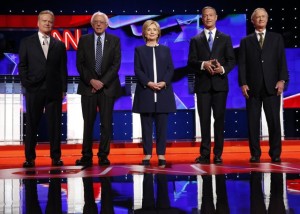The Democratic presidential candidates had a fair amount to say last night about the disappearing middle class, but not about where all of those fallen people can afford to live. Housing unaffordability is a “crisis” throughout the country, judging from news accounts, but it was not among the “pressing issues” deemed worthy of discussion in the debate.
One likely reason is that “pressing issues” for the purpose of this debate were defined, in part, by the volume of traffic they generate on Facebook. Perhaps housing advocates need to devote themselves more devoutly to social media.
Another reason, as we’ve suggested in previous posts, is that any substantial solution to the affordability problem will require major federal investments, in the form of subsidies, public housing and so forth. To be sure, raising wages – as the candidates pledged to do – will help alleviate the problem, but even a minimum wage of $15 will leave millions of people house-poor.
Here’s an idea that might have been introduced during the debate’s back-and-forths about capitalism, but wasn’t: Housing, like education and health care, is basic human need that requires major governmental intervention and that can’t simply be left to market forces. Don’t take our word for it –check out what an establishmentarian magazine, The Economist, has to say about housing as one of capitalism’s unmet challenges.
Another housing topic the candidates bypassed was the pronounced racial segregation that still marks residential settlement patterns in metropolitan areas all over the country, 47 years after the passage of a Fair Housing Act that was intended to undo that segregation.
They had opportunities to discuss this, when they were invited to talk about “issues of race in America” or the unrest in Baltimore, but the focus remained on reforming the criminal justice system, improving educational opportunities, and so forth. Not that these aren’t important, but there’s another perspective on the events of Baltimore and Ferguson that deserves attention. Consider this analysis by the Economic Policy Institute’s Richard Rothstein, published soon after the Baltimore riots:
“Whenever young black men riot in response to police brutality or murder, as they have done in Baltimore this week, we’re tempted to think we can address the problem by improving police quality—training officers not to use excessive force, implementing community policing, encouraging police to be more sensitive, prohibiting racial profiling, and so on. These are all good, necessary, and important things to do. But such proposals ignore the obvious reality that the protests are not really (or primarily) about policing.
“Baltimore, not at all uniquely, has experienced a century of public policy designed, consciously so, to segregate and impoverish its black population. A legacy of these policies is the rioting we have seen ….Whether after the 1967 wave of riots that led to the Kerner Commission report, after the 1992 Los Angeles riot that followed the acquittal of police officers who beat Rodney King, or after the recent wave of confrontations and vandalism following police killings of black men, community leaders typically say, properly, that violence isn’t the answer and that after peace is restored, we can deal with the underlying problems. We never do so.
“Certainly, African American citizens of Baltimore were provoked by aggressive, hostile, even murderous policing, but … (w)ithout suburban integration, something barely on today’s public policy agenda, ghetto conditions will persist, giving rise to aggressive policing and the riots that inevitably ensue. Like Ferguson before it, Baltimore will not be the last such conflagration the nation needlessly experiences.”
